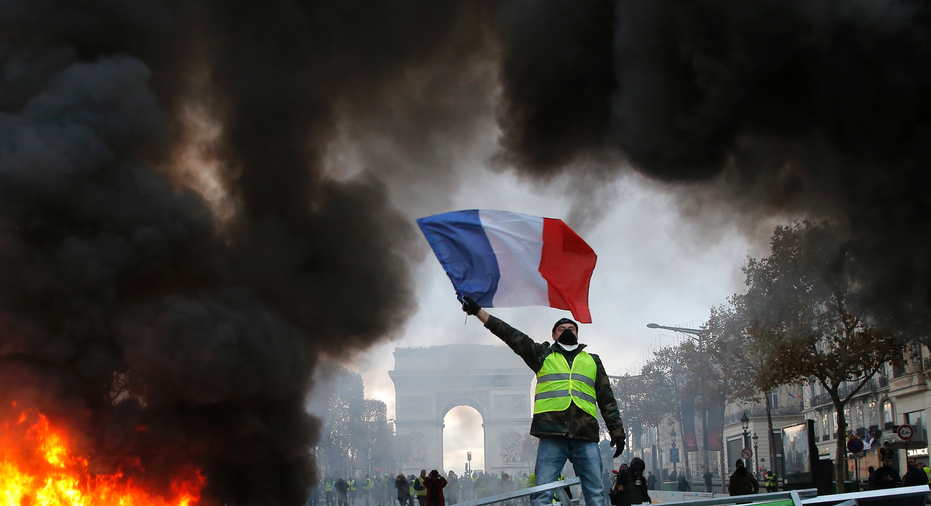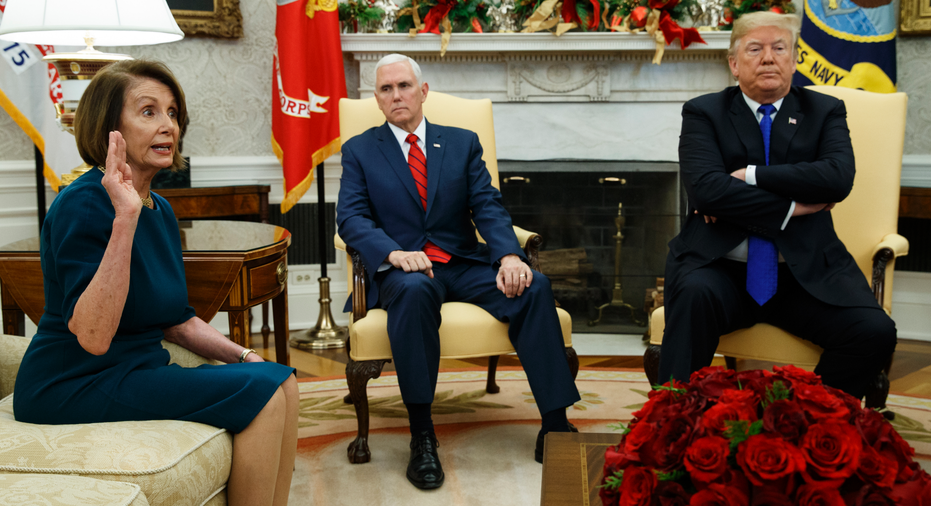Analysis: In democracies' political chaos, new model emerges
FILE - In this Nov. 24, 2018 file photo, a demonstrator waves the French flag on a burning barricade on the Champs-Elysees avenue with the Arc de Triomphe in background, during a demonstration against the rise of fuel taxes. Across the world, people are questioning truths they had long held to be self-evident, and they are dismissing some of them as fake news. They are replacing traditions they had long seen as immutable with haphazard reinvention. In France, people who feel left behind by a globalizing world have spent the last few weeks marching and rioting to protest a government they call elitist and out of touch. (AP Photo/Michel Euler, File)
LONDON – Bickering in the Oval Office. Shouting at the Houses of Parliament. Rioting on the Champs-Elysees.
It's a chaotic moment for the countries that have long underpinned the global order, a time of instability for the balance of power that has reigned for decades.
Across the world, people are questioning truths they had long held to be self-evident, and they are dismissing some of them as fake news. They are replacing traditions they had long seen as immutable with haphazard reinvention.
In France, people who feel left behind by a globalizing world have spent the last few weeks marching and rioting to protest a government they call elitist and out of touch. The government, whose initial dismissiveness seemed to confirm their suspicions, was finally forced to change tack.
Britain is still shuddering from a referendum that its government called to muzzle naysayers, only to see those naysayers win the day. Now, as politicians go through awkward contortions to deliver on that vote, the government is on the verge of collapse.
And in the United States, a president who some accuse of upending ideals that the nation holds dear is aggressively abandoning protocol and customs that have prevailed through a dozen of his predecessors. His core followers are thrilled; many others are getting vertigo.
What's more, these events are playing out not only in the lands of Liberty, Equality and Fraternity, of the Magna Carta and of the Declaration of Independence, but across the Western world.
It's a similar narrative in each place: People outside the centers of power are rejecting political elites they feel take them for granted, and backing new movements that eschew the rules and that often play to their basest thoughts.
To be clear, this isn't a weakening of democracy. In a way, it's the opposite.
IS CONSENSUS OUTDATED?
The flavor of democracy most familiar to the West is an indirect one, with voters' desires helping to shape the institutions that do the governing — and that often act as mannered buffers that calm stormy political waters.
The emerging models, though, summon a more fundamental, sometimes brasher form of democracy in which votes and other political expressions have a more direct effect, or in which they empower an individual who can bypass those institutions.
In the process, these democratic nations risk losing a tradition of consensus decades old — an agreement among one another about how to live, how to govern and how to interact with others that has prevailed since the end of World War II.
How did this all happen?
Let's back up a decade, to when the Ponzi scheme of low-deposit, high-risk mortgages brought the global financial system to its knees. The resulting years of recession and austerity added up to a betrayal of the unspoken guarantee that had kept the political establishment in place for decades: that each generation would be better off than the last.
"We haven't forgotten 2008," reads graffiti on a bank near Paris' riot-scarred Champs-Elysees. "Give us our money back."
Add to that disruptive technology that is replacing accountants with algorithms, secretaries with Siri and drivers with their own trucks. Mix in the ubiquity of social media, which has removed the filters of truthfulness and civility that once moderated political discourse. Top it off with a campaign of hacking, promoted by enemies of the West and designed to misinform, elevate suspicions and create ruckus.
That combustible mix exploded in 2016, and the mushroom cloud is still rising.
In June of that year, after more than four decades of ambivalent membership in the European club, Britain held a referendum that intended — in the words of then-Prime Minister David Cameron — "to settle this European question" once and for all.
After a campaign filled with xenophobic fearmongering and finance violations, Britons turned out in large numbers and voted narrowly to leave the European Union, sending shockwaves through the political establishment.
Cameron resigned, leaving successor Theresa May the unenviable task of trying to navigate an elegant departure amid gleeful "Brexiteers," panicking "remainers" and exasperated European frenemies. She narrowly survived a leadership challenge Wednesday, but her government could fall at any time as she tries to prevent a potentially catastrophic "no-deal" Brexit on March 29.
In November 2016, it was America's turn to buck tradition. After an uncivil campaign that broke the Internet, Donald Trump won a bitter vote to become leader of the free world. Pretty much everything that has happened since has continued off script.
From his impetuous foreign policy to his testing of the American tradition of separation of powers, Trump's entire palette of activities has drawn questions about whether he — and by extension the United States — will stick to long-held principles and commitments. For the most powerful nation on Earth, that uncertainty is no small matter.
France stepped up the following May, when a young banker and former economy minister managed to persuade voters that he was an outsider. Emmanuel Macron's hyperglobalism contrasted with Trump's xenophobia, but he too argued he would drain the swamp and stand up for common people.
That promise faded quickly. Macron soon became known as the "president of the rich," an image not helped by his arrogant proclamation that France needs a "Jupiter," chief of the Roman gods.
Anger peaked when, in an ostensibly environmentalist move, he pledged to raise already exorbitant taxes on gasoline. People fed up over high taxes and high cost of living spilled into the streets, some violently, in protests that have shaken the country and forced Macron to backtrack.
UP NEXT: MORE UNCERTAINTY
The chaos doesn't end there.
Across the world, politicians are reading from a new playbook. From the Philippines' Rodrigo Duterte to Brazil's Jair Bolsonaro, candidates are winning elections despite — or perhaps because of — statements and actions so politically incorrect that until recently they would have guaranteed defeat. And the newly jumbled landscape provides openings for nations like China, which are looking to extend their influences into fresh corners of the planet.
Is this a pivot point in modern political history? Western liberal democracy seems almost quaint now, loitering quietly in the corner as its most prominent standing proponent, German Chancellor Angela Merkel, steps slowly out of the limelight.
The themes of Western democratic revolutions remain more relevant than ever, even in new forms. Whether these sharp new voices represent new paths to liberty remains an open question, as does whether the result will be the greater equality that so many say they crave.
And beyond those two questions hangs another, perhaps even more of the moment: At this inflection point of tumultuous transformation, does fraternity — the postwar glue that long held together a collage of nations — stand any chance of surviving?
___
Niko Price has reported for The Associated Press for more than 25 years from five continents.





















